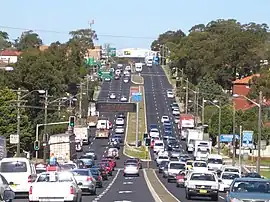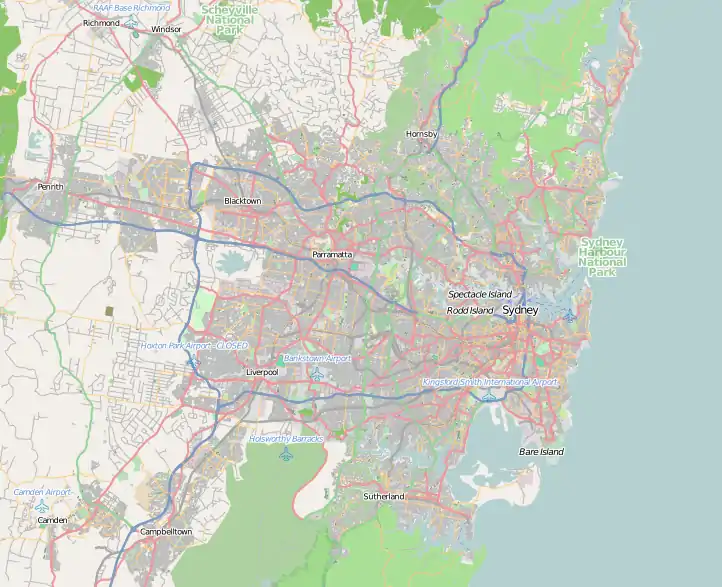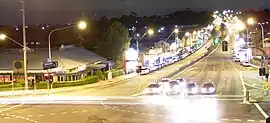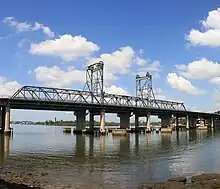A3 (Sydney)
The A3 is a route designation of a major metropolitan arterial route through suburban Sydney, connecting the A8 at Mona Vale at its northern end, to Princes Highway at Blakehurst at its southern end. This name covers a few consecutive roads and is widely known to most drivers, but the entire allocation is also known – and signposted – by the names of its constituent parts: Mona Vale Road, Ryde Road, Lane Cove Road, Devlin Street, Church Street, Concord Road, Homebush Bay Drive, Centenary Drive, Roberts Road, Wiley Avenue and King Georges Road.
A3 (numerous constituent roads) | |
|---|---|
 | |
| Looking south along King Georges Road at Roselands | |
 North end South end | |
| Coordinates |
|
| General information | |
| Type | Road |
| Length | 51.3 km (32 mi)[1] |
| Gazetted | August 1928[2] |
| Route number(s) | |
| Former route number |
|
| Major junctions | |
| North end | Mona Vale, Sydney |
| |
| South end | Blakehurst, Sydney |
| Location(s) | |
| Major suburbs | Terrey Hills, Pymble, Macquarie Park, Ryde, Rhodes, Sydney Olympic Park, Chullora, Wiley Park, Beverly Hills, Hurstville |
| Highway system | |
It is a major connector between most of the major radial routes emanating from central Sydney, and a major link between the northern and southern parts of the Sydney tolled orbital freeway. It is the most direct, although not necessarily the quickest, route across Sydney between the South Coast and the North Coast. It is one of only three road connections between the Northern Beaches region of Sydney and the rest of Sydney (the other two being routes A38 and A8.
Route

The A3 commences at the intersection of Pittwater Road at Mona Vale and heads in a southwesterly direction as Mona Vale Road as a two-lane, single carriageway road, widening to a four-lane, dual-carriageway road at Terrey Hills and to a six-lane, dual-carriageway road at St Ives, before running under Pacific Highway at an interchange at Pymble. It changes name to Ryde Road and continues in a southwesterly direction, crossing the Lane Cove River over De Burghs Bridge and changing names to Lane Cove Road, before crossing M2 Hills Motorway at Macquarie Park and then Epping Road in North Ryde shortly afterwards. It changes name again to Devlin Street at the intersection with Blaxland Road at Ryde, and then runs under Victoria Road at an interchange shortly after, before changing name again to Church Street, crossing Parramatta River over Ryde Bridge, and changing name to Concord Road.
Just south of Rhodes, it changes name to Homebush Bay Drive and heads in a southerly direction, crossing M4 Western Motorway and changing name again to Centenary Drive, then over Great Western Highway in a short distance just south of Sydney Olympic Park. Marlborough Road, which serves as an on-off ramp on both sides of the main roadway in the vicinity of the Flemington markets, and the associated loop road, is part of the route designation.[3]
It crosses over Hume Highway at Strathfield South, where it changes name to Roberts Road, and continues south to Greenacre, where it diverts southeast and changes name again to Wiley Avenue, before meeting Punchbowl Road at Lakemba, New South Wales, where it changes name for the last time to King Georges Road and continues in a southeasterly direction. After crossing M5 South Western Motorway at Beverly Hills, the road narrows to a four-lane, single-carriageway road before eventually terminating at an intersection with Princes Highway at Blakehurst.
Much of the route becomes very congested in peak hour. The highest speed limit on the A3 is 90 km/h (56 mph) on Mona Vale Road.
History

The passing of the Main Roads Act of 1924[4] through the Parliament of New South Wales provided for the declaration of Main Roads, roads partially funded by the State government through the Main Roads Board (later the Department of Main Roads, and eventually Transport for NSW). Main Road No. 139 was declared along Devlin Street between Gladesville Road (today Blaxland Road) in Ryde (and continuing northwards via Eastwood and Epping to the intersection with Pennant Hills Road in Pennant Hills),[2] Main Road No. 162 was declared along Wicks, Pittwater and Lane Cove Roads through Ryde, Ryde Road through Gordon, then via St. Ives to the intersection with Pittwater Road in Mona Vale,[2] and Main Road No. 200 was declared from the intersection of Great Western Highway and Concord Road in Concord, along Concord Road to Parramatta River (using the punt service between Rhodes and Meadowbanks) then along Bowden Street to Parramatta Road (today Victoria Road),[2] on the same day, 8 August 1928, and Main Road 315 was declared on 19 February 1929, from the intersection with Great Western Highway south along Concord Road through Strathfield, The Boulevard, Punchbowl Road, Wiley Avenue, Canary Road and Belmore Road to Hurstville (and continuing south along Woniora Road to meet Princes Highway at Blakehurst);[5] with the passing of the Main Roads (Amendment) Act of 1929[6] to provide for additional declarations of State Highways and Trunk Roads, these was amended to Main Roads 139 and 162 and 200 and 315 on 8 April 1929.
The punt service across Parramatta River was replaced by Ryde Bridge in 1935, changing the alignment to today's route along Church Street to meet Devlin Street in Ryde on 19 March 1935.[7]
Main Road 162 was officially named Mona Vale Road, between Pittwater Road in Mona Vale and Pacific Highway Pymble, on 10 January 1951,[8] and Ryde Road, between Pacific Highway and De Burghs Bridge in West Pymble (previously known as The Broadway), on 27 February 1952.[9] Main Road 315 was officially named King Georges Road, between Punchbowl Road in Lakemba and Princes Highway in Blakehurst (previously known as Wiley Avenue, Canary Road, Dumbleton Road and Belmore Road), on 24 September 1952,[10] and Main Road 200 was officially named Church Street, between Devlin Street in Ryde and Ryde Bridge, on 6 May 1953.[11] Ryde Council later constructed a new alignment through Ryde, changing from Wicks and Pittwater Roads to today's Lane Cove Road in September 1961. The southern end of Main Road 315 between Hurstville and Blakeville was re-aligned to follow the entire length of King Georges Road (and terminate at Princes Highway some distance south than its previous intersection at Woniora Road) on 11 November 1964.[12]
What is now called A3 was initially designated to become a major north–south metropolitan arterial route in 1964, when the route incorporating the existing local arterial roads above was designated Ring Road 3.[13] After 1964, upgrading projects were commenced, with the construction of new De Burghs Bridges over the Lane Cove River between Pymble and Ryde (1967). A grade-separated crossing was constructed at Epping Road at North Ryde (1978).[14]
Prior to 1983, the route passed through the Strathfield town centre, proceeding along (north to south) Concord Road, The Boulevarde, Coronation Parade and Punchbowl Road, to join King Georges Road. The part of this route that passes through Strathfield town centre was very congested and also problematical to widen. A major deviation of this part of the route was built between 1983 and 1998, relocating the arterial route to the west between Rhodes and Wiley Park, to bypass the Strathfield bottleneck and improve access to the Olympic Precinct at Homebush Bay. Called the "Strathfield Bypass" at the time, the deviation route includes the new Homebush Bay Drive and Centenary Drive (named for the centenary of Strathfield Municipality), and an upgraded Roberts Road though Chullora and Greenacre, connecting to King Georges Road near Wiley Park. The road upgrades, new bridges and connections for this deviation were completed in stages between 1983 and 1998.[14] At this time, the southern end of Main Road 200 was altered, from its earlier alignment along Concord Road between Ryde Bridge and Strathfield, to Homebush Bay Drive, Centenary Drive, Roberts Road, Wiley Avenue and King Georges Road to terminate with Princes Highway at Blakeville, subsuming the southern half of Main Road 315 (its northern half, along Punchbowl Road, was made part of Main Road 549, and from Stathfield along The Boulevard, was replaced by Main Road 668, which was also routed north along the former alignment of Main Road 200, from Strathfield along Concord Road to meet Homebush Bay Drive just south of Ryde Bridge), on 22 January 1993.[15]
Also during this period, Ryde Bridge over the Parramatta River between Ryde and Rhodes was duplicated (1988), grade-separate crossings were constructed at the Pacific Highway at Pymble (grade separation completed in 1989). As a major access route to Sydney Olympic Park, a grade-separated crossing was constructed at the M4 Western Motorway and Parramatta Road, at Flemington (1992) and the intersection with Australia Avenue and Underwood Road at Homebush (1998). Grade-separated crossings were also constructed at M2 Hills Motorway at Macquarie Park (1997), at Victoria Road at Top Ryde (1998),[14] the Hume Highway at Chullora (1998), and the M5 South Western Motorway at Beverly Hills (2001).
The passing of the Roads Act of 1993[16] updated road classifications and the way they could be declared within New South Wales. Under this act, the A3 retains its declaration as Main Roads 139 (as Devlin Street), 162 (as Lane Cove, Ryde and Mona Vale Roads), and Main Road 200 (Church Street, Homebush Bay and Centenary Drives, Roberts Road, Wiley Avenue and King Georges Road).[17]
The route was allocated Ring Road 3 in 1964, before it was replaced with State Route 33 in 1974. When the new alignment around Strathfield (along Homebush Bay and Centenary Drives and Roberts Road) opened, State Route 33 was rerouted along it, with the original alignment through Strathfield (along The Boulevarde and Punchbowl Road, along Main Roads 549 and 668) was subsequently allocated State Route 27 in December 1992, later decommissioned in 2004.[18] The whole route was re-designated Metroad 3 in April 1993,[14] one of Sydney's only Metroad routes not to have changed alignment since their introduction. With the conversion to the newer alphanumeric system in 2013, Metroad 3 was replaced by route A3.[19]
Exits and interchanges
| LGA | Location | km[1] | mi | Destinations | Notes |
|---|---|---|---|---|---|
| Northern Beaches | Mona Vale | 0.0 | 0.0 | Northern terminus of route A3 Northern end of Mona Vale Road | |
| Terrey Hills | 8.1 | 5.0 | McCarrs Creek Road – Cottage Point, Church Point | ||
| Terrey Hills–Belrose boundary | 10.5 | 6.5 | Myoora Road (north) – Terrey Hills Forest Way (south) – Frenchs Forest | ||
| Ku-ring-gai | Pymble–Gordon boundary | 20.1 | 12.5 | North Shore railway line | |
| 20.2 | 12.6 | Southern end of Mona Vale Road Northern end of Ryde Road | |||
| Lane Cove River | 23.4 | 14.5 | De Burghs Bridge | ||
| Ryde | Macquarie Park | 24.1 | 15.0 | No westbound exit from motorway onto Lane Cove Road | |
| Macquarie Park–North Ryde boundary | 25.0 | 15.5 | Epping Road – Epping, Lane Cove | ||
| Ryde | 28.2 | 17.5 | Blaxland Road (north) – Epping | No right turn northbound into Blaxland Road Southern end of Lane Cove Road Northern end of Devlin Street | |
| 28.9 | 18.0 | Southern end of Devlin Street Northern end of Church Street | |||
| Parramatta River | 30.0 | 18.6 | Ryde Bridge | ||
| Canada Bay | Rhodes–Concord West boundary | 31.6 | 19.6 | Concord Road – Strathfield | |
| 31.9 | 19.8 | Main Northern railway line | |||
| Powells Creek | 33.5 | 20.8 | Bridge (no known official name) | ||
| Canada Bay | Sydney Olympic Park–Homebush boundary | 34.1 | 21.2 | Australia Avenue (west) – Sydney Olympic Park Underwood Road (east) – Homebush | |
| Canada Bay–Strathfield boundary | Sydney Olympic Park–Homebush West boundary | 34.8 | 21.6 | Southern end of Homebush Bay Drive Northern end of Centenary Drive | |
| Strathfield | Homebush West | 35.0 | 21.7 | Access via Marlborough Road | |
| 35.7 | 22.2 | Main Suburban railway line | |||
| Strathfield–Canterbury-Bankstown boundary | Greenacre–Strathfield–Strathfield South tripoint | 38.3 | 23.8 | Southern end of Centenary Drive Northern end of Roberts Road | |
| Flemington-Campsie Goods Line | |||||
| Canterbury-Bankstown | Greenacre | 41.7 | 25.9 | Roberts Road (south) – Punchbowl | Southern end of Roberts Road Northern end of Wiley Avenue |
| Punchbowl–Lakemba–Wiley Park tripoint | 41.9 | 26.0 | Punchbowl Road – Punchbowl, Strathfield South | Southern end of Wiley Avenue Northern end of King Georges Road | |
| Wiley Park | 42.6 | 26.5 | Bankstown railway line | ||
| Wiley Park–Roselands boundary | 43.4 | 27.0 | |||
| Canterbury-Bankstown–Georges River boundary | Beverly Hills | 45.0 | 28.0 | ||
| Georges River | 45.8 | 28.5 | East Hills railway line | ||
| Penshurst–Hurstville boundary | 47.8 | 29.7 | Forest Road – Lugarno, Arncliffe | ||
| 48.0 | 29.8 | South Coast railway line | |||
| Blakehurst | 51.3 | 31.9 | Stuart Street – Blakehurst | ||
| Southern terminus of route A3 Southern end of King Georges Road | |||||
See also
References
- Google (17 August 2022). "A3 road" (Map). Google Maps. Google. Retrieved 17 August 2022.
- "Main Roads Act, 1924-1927". Government Gazette of the State of New South Wales. No. 110. National Library of Australia. 17 August 1928. pp. 3814–20. Archived from the original on 3 August 2022. Retrieved 1 August 2022.
- "RMS - Schedule of Classified Roads" (PDF). Archived from the original (PDF) on 25 August 2022. Retrieved 20 May 2021.
- State of New South Wales, An Act to provide for the better construction, maintenance, and financing of main roads; to provide for developmental roads; to constitute a Main Roads Board Archived 11 August 2022 at the Wayback Machine 10 November 1924
- "Main Roads Act, 1924-1927". Government Gazette of the State of New South Wales. No. 37. National Library of Australia. 15 March 1929. p. 1275. Archived from the original on 4 May 2023. Retrieved 4 May 2023.
- State of New South Wales, An Act to amend the Main Roads Act, 1924-1927; to confer certain further powers upon the Main Roads Board; to amend the Local Government Act, 1919, and certain other Acts; to validate certain payments and other matters; and for purposes connected therewith. Archived 12 August 2022 at the Wayback Machine 8 April 1929
- "Main Roads Act, 1924-1934". Government Gazette of the State of New South Wales. No. 66. National Library of Australia. 29 March 1935. p. 1343. Archived from the original on 4 May 2023. Retrieved 4 May 2023.
- "Main Roads Act, 1924-1950". Government Gazette of the State of New South Wales. No. 16. National Library of Australia. 2 February 1951. p. 290. Archived from the original on 4 May 2023. Retrieved 4 May 2023.
- "Main Roads Act, 1924-1951". Government Gazette of the State of New South Wales. No. 56. National Library of Australia. 14 March 1952. pp. 796–7. Archived from the original on 4 May 2023. Retrieved 4 May 2023.
- "Main Roads Act, 1924-1951". Government Gazette of the State of New South Wales. No. 215. National Library of Australia. 17 October 1952. p. 3718. Archived from the original on 4 May 2023. Retrieved 4 May 2023.
- "Main Roads Act, 1924-1951". Government Gazette of the State of New South Wales. No. 107. National Library of Australia. 29 May 1953. p. 1742. Archived from the original on 4 May 2023. Retrieved 4 May 2023.
- "Main Roads Act, 1924-1963". Government Gazette of the State of New South Wales. No. 140. National Library of Australia. 11 December 1964. p. 4007. Archived from the original on 4 May 2023. Retrieved 4 May 2023.
- Sydney Ring Road, Ozroads. Retrieved 16 June 2013.
- "Metroad 3 History". Ozroads. Retrieved 16 June 2013.
- "State Roads Act". Government Gazette of the State of New South Wales. No. 7. National Library of Australia. 22 January 1993. pp. 223–30. Archived from the original on 4 May 2023. Retrieved 4 May 2023.
- State of New South Wales, An Act to make provision with respect to the roads of New South Wales; to repeal the State Roads Act 1986, the Crown and Other Roads Act 1990 and certain other enactments; and for other purposes. Archived 11 August 2022 at the Wayback Machine 10 November 1924
- Transport for NSW (August 2022). "Schedule of Classified Roads and Unclassified Regional Roads" (PDF). Government of New South Wales. Archived from the original (PDF) on 25 August 2022. Retrieved 1 August 2022.
- "State Route 27". Ozroads. Retrieved 2 August 2013.
- "Road number and name changes in NSW" (PDF). Roads & Maritime Services. Government of New South Wales. 2012. Archived from the original (PDF) on 25 March 2016. Retrieved 7 November 2016.